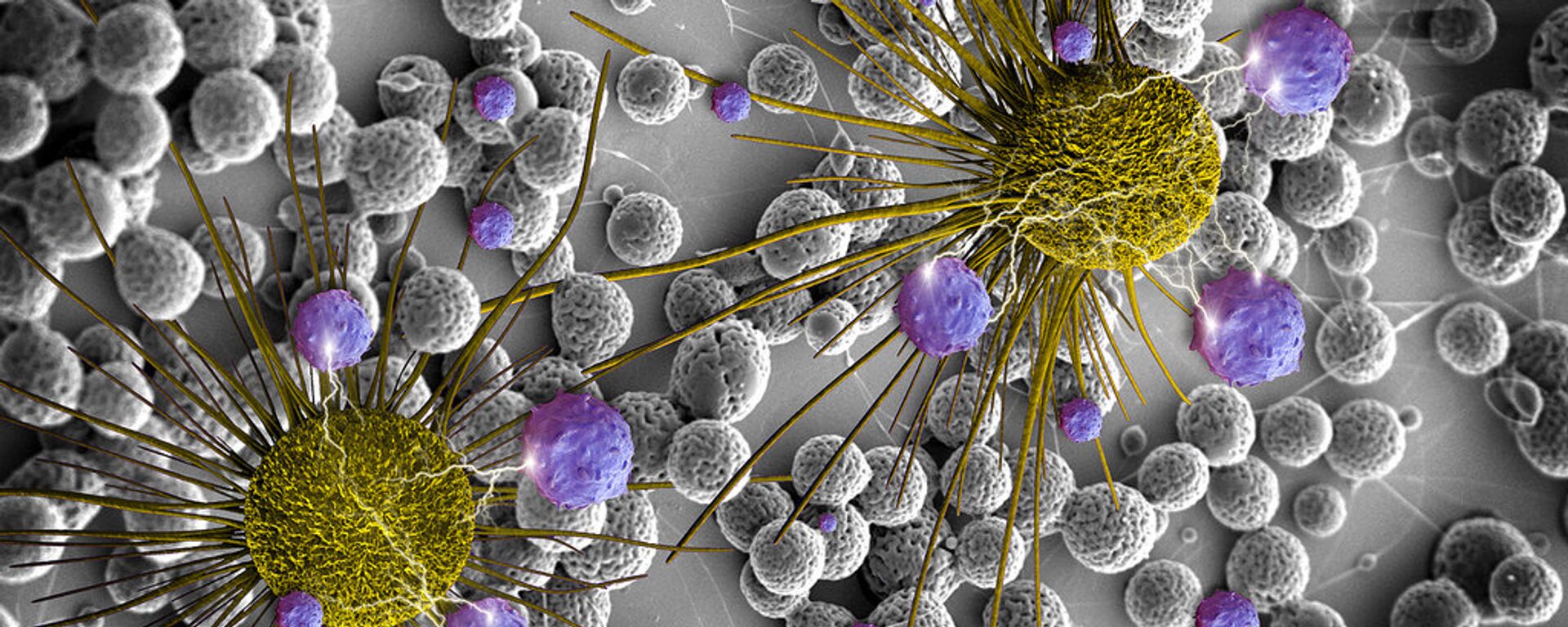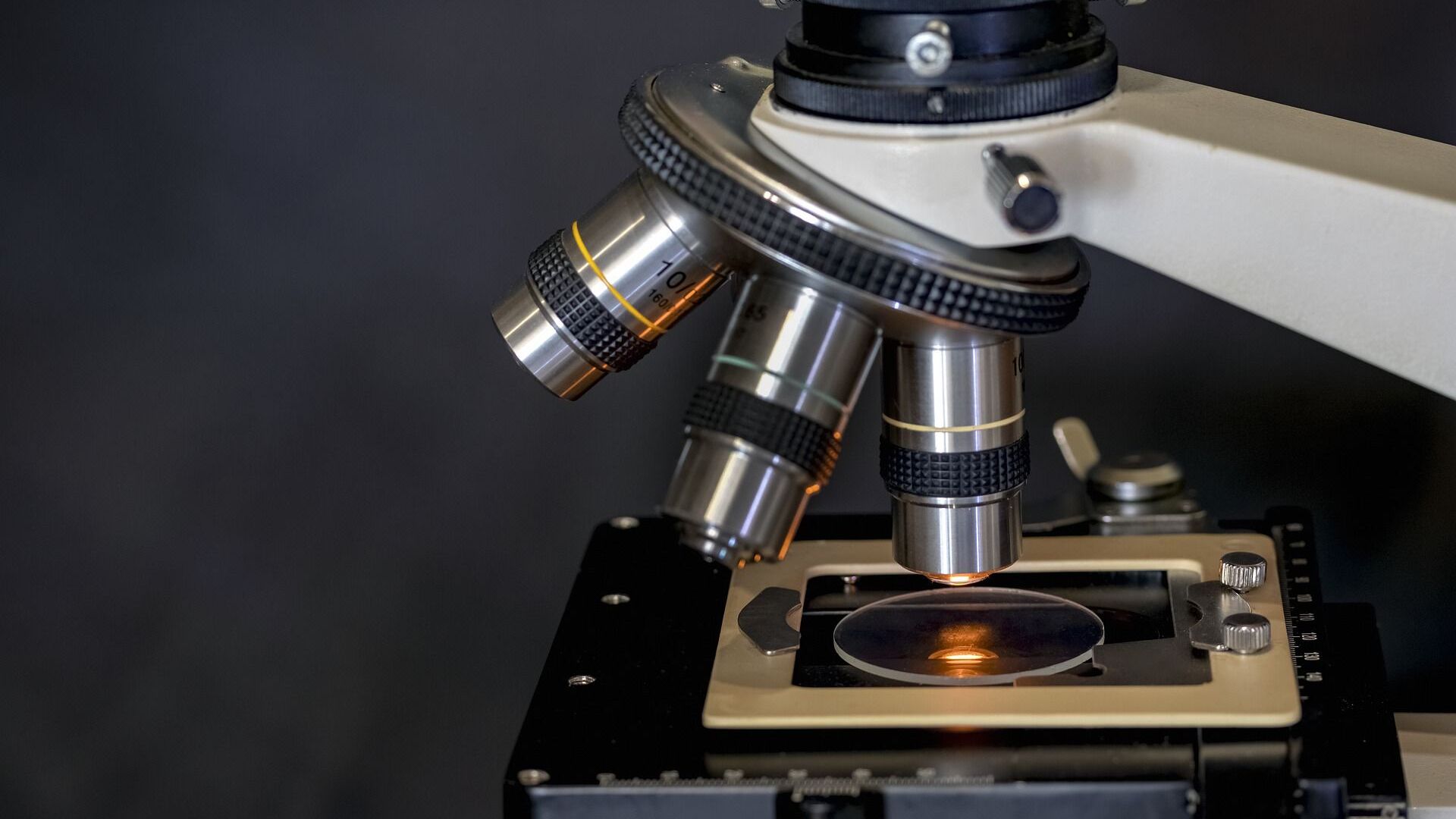https://sputnikglobe.com/20220422/ray-of-hope-new-study-may-help-understand-each-persons-cancer-precisely-1094972265.html
Ray of Hope? New Study May Help Understand Each Person's Cancer 'Precisely'
Ray of Hope? New Study May Help Understand Each Person's Cancer 'Precisely'
Sputnik International
With about 19 million new cancer cases and almost 10 million oncology-related deaths registered worldwide in 2020, finding effective methods to swiftly detect... 22.04.2022, Sputnik International
2022-04-22T15:19+0000
2022-04-22T15:19+0000
2023-05-28T15:19+0000
cancer
study
researchers
united kingdom (uk)
https://cdn1.img.sputnikglobe.com/img/07e5/04/1d/1082760839_0:100:1921:1180_1920x0_80_0_0_41b5bcb716febd5350449b0c6f0736d5.jpg
In a new study published in the journal Science, UK researchers looked at 19 different types of cancer, managing to detect 58 new clues about the so-called “mutational signatures" that contribute to the development of the disease.Some of these patterns emerge due to problems in a person’s cells, while others are caused by environmental factors such as ultraviolet radiation, tobacco smoke or chemicals, according to the research.Serena Nik-Zainal, the principal author of the study and the professor of genomic medicine and bioinformatics at the University of Cambridge, said that spotting more of the patterns helps scientists “to understand each person’s cancer more precisely”.She drew the analogy of “looking at a very busy beach with thousands of footprints in the sand”, saying that “to the untrained eye, the footprints appear to be random and meaningless”.The professor also likened mutational signatures to “fingerprints at a crime scene”, something that she said helps “to pinpoint cancer culprits”According to Nik-Zainal, “some mutational signatures have clinical or treatment implications – they can highlight abnormalities that may be targeted with specific drugs or may indicate a potential ‘achilles heel’ in individual cancers”.That was echoed by Michelle Mitchell, chief executive of the world's leading independent cancer charity Cancer Research UK. Mitchell said the study “shows how powerful whole-genome sequencing tests can be in giving clues into how the cancer may have developed, how it will behave and what treatment options would work best”.
https://sputnikglobe.com/20220217/anti-cancer-material-extracted-from-tropical-plant-created-in-russia-1093102353.html
united kingdom (uk)
Sputnik International
feedback@sputniknews.com
+74956456601
MIA „Rosiya Segodnya“
2022
Oleg Burunov
https://cdn1.img.sputnikglobe.com/img/07e4/09/0b/1080424846_0:0:2048:2048_100x100_80_0_0_3d7b461f8a98586fa3fe739930816aea.jpg
Oleg Burunov
https://cdn1.img.sputnikglobe.com/img/07e4/09/0b/1080424846_0:0:2048:2048_100x100_80_0_0_3d7b461f8a98586fa3fe739930816aea.jpg
News
en_EN
Sputnik International
feedback@sputniknews.com
+74956456601
MIA „Rosiya Segodnya“
Sputnik International
feedback@sputniknews.com
+74956456601
MIA „Rosiya Segodnya“
Oleg Burunov
https://cdn1.img.sputnikglobe.com/img/07e4/09/0b/1080424846_0:0:2048:2048_100x100_80_0_0_3d7b461f8a98586fa3fe739930816aea.jpg
cancer, study, researchers, united kingdom (uk)
cancer, study, researchers, united kingdom (uk)
Ray of Hope? New Study May Help Understand Each Person's Cancer 'Precisely'
15:19 GMT 22.04.2022 (Updated: 15:19 GMT 28.05.2023) With about 19 million new cancer cases and almost 10 million oncology-related deaths registered worldwide in 2020, finding effective methods to swiftly detect the disease remains a key priority for doctors across the globe.
In a new study published in the journal Science, UK researchers looked at 19 different types of cancer, managing to detect 58 new clues about the so-called “mutational signatures" that contribute to the development of the disease.
Some of these patterns emerge due to problems in a person’s cells, while others are caused by environmental factors such as ultraviolet radiation, tobacco smoke or chemicals, according to the research.
Serena Nik-Zainal, the principal author of the study and the professor of genomic medicine and bioinformatics at the University of Cambridge, said that spotting more of the patterns helps scientists “to understand each person’s cancer more precisely”.

17 February 2022, 07:10 GMT
She drew the analogy of “looking at a very busy beach with thousands of footprints in the sand”, saying that “to the untrained eye, the footprints appear to be random and meaningless”.
“But if you are able to study them closely, you can learn a lot about what’s been going on, distinguish between animal and human prints, whether it’s an adult or child, what direction they’re travelling in, etc. It’s the same thing with the mutational signatures. The use of whole genome sequencing can identify which ‘footprints’ are relevant/important and reveal what’s happened through the development of the cancer”, Nik-Zainal stressed.
The professor also likened mutational signatures to “fingerprints at a crime scene”, something that she said helps “to pinpoint cancer culprits”
According to Nik-Zainal, “some mutational signatures have clinical or treatment implications – they can highlight abnormalities that may be targeted with specific drugs or may indicate a potential ‘achilles heel’ in individual cancers”.
That was echoed by Michelle Mitchell, chief executive of the world's leading independent cancer charity Cancer Research UK. Mitchell said the study “shows how powerful whole-genome sequencing tests can be in giving clues into how the cancer may have developed, how it will behave and what treatment options would work best”.





